Multiple Choice
Identify the
choice that best completes the statement or answers the question.
|
|
|
1.
|
Determine tan A and tan C. 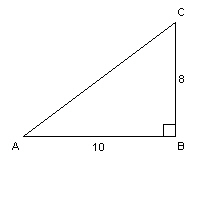 a. | tan A = 1.25; tan C = 0.8 | c. | tan A = 0.8; tan C =
1.25 | b. | tan A = 0.8; tan C = 0.7809... | d. | tan A = 0.6247...; tan C =
1.25 |
|
|
|
2.
|
Determine the measure of ÐABD to the nearest
tenth of a degree. 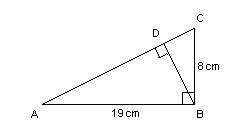 a. | 65.1° | b. | 67.2° | c. | 22.8° | d. | 24.9° |
|
|
|
3.
|
Determine the length of side z to the nearest tenth of a
centimetre. 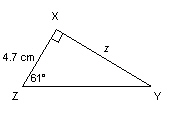 a. | 9.7 cm | b. | 2.6 cm | c. | 5.4 cm | d. | 8.5
cm |
|
|
|
4.
|
A ladder leans against a wall. The base of the ladder is on level ground 1.2 m
from the wall. The angle between the ladder and the ground is 70°.
How far up the wall does the ladder reach, to the nearest tenth of a metre?
a. | 0.4 m | b. | 1.3 m | c. | 3.5 m | d. | 3.3
m |
|
|
|
5.
|
Terry is lying on the ground near the B.C. Legislature Building. The angle
between the ground and his line of sight to the highest point on the building is 53°. The height of the building, from the ground to its highest point, is
about 43 m. About how far is Terry from a point on the ground vertically below the highest point on
the building? Give the answer to the nearest metre.
|
|
|
6.
|
A flagpole casts a shadow that is 21 m long when the angle between the
sun’s rays and the ground is 48°. Determine the height of the
flagpole, to the nearest metre.
|
|
|
7.
|
The angle between one shorter side of a rectangle and a diagonal is 64°. One longer side of the rectangle is 9.2 cm. What is the width of the
rectangle, to the nearest tenth of a centimetre?
a. | 4.0 cm | b. | 18.9 cm | c. | 8.3 cm | d. | 4.5
cm |
|
|
|
8.
|
From a point 18 ft. from the base of a flagpole, Seema used a clinometer to
sight the top of the flagpole. Seema held the clinometer 5 ft. 3 in. above the ground. The angle
between the horizontal and the line of sight was 52°. Determine the
height of the flagpole to the nearest foot.
a. | 28 ft. | b. | 34 ft. | c. | 19 ft. | d. | 23
ft. |
|
|
|
9.
|
Determine sin A and cos A to the nearest tenth. 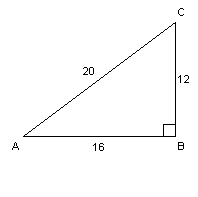 a. | sin A = 1.7; cos A = 0.8 | c. | sin A = 0.6; cos A = 1.3
| b. | sin A = 0.8; cos A = 0.6 | d. | sin A = 0.6; cos A = 0.8
|
|
|
|
10.
|
Determine the measure of ÐQ to the nearest tenth
of a degree. 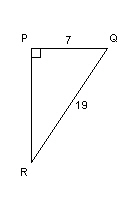 a. | 68.4° | b. | 69.8° | c. | 21.6° | d. | 20.2° |
|
|
|
11.
|
A rectangle is 5.1 cm wide and each diagonal is 9.3 cm long. What is the measure
of the angle between a diagonal and the shorter side of the rectangle to the nearest tenth of a
degree?
a. | 33.3° | b. | 61.3° | c. | 56.7° | d. | 28.7° |
|
|
|
12.
|
The route along the Kettle Valley Railway rises approximately 850.0 m from
Penticton to Chute Lake. The distance measured along this route is 43.6 km. Assume this is a straight
path. Determine the angle of inclination of the path to the nearest tenth of a degree.
a. | 88.9° | b. | 2.9° | c. | 11.2° | d. | 1.1° |
|
|
|
13.
|
A ladder is 8.0 m long. It leans against a wall. The angle of inclination of the
ladder is 72°. To the nearest tenth of a metre, how far from the wall
is the base of the ladder?
a. | 2.6 m | b. | 7.6 m | c. | 25.9 m | d. | 2.5
m |
|
|
|
14.
|
Solve this right triangle. Give the measures to the nearest tenth. 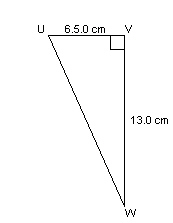
|
|
|
15.
|
Solve this right triangle. Give the measures to the nearest tenth. 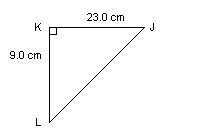
|
|
|
16.
|
Determine the length of this wheelchair ramp to the nearest hundredth of a
metre.  a. | 4.60 m | b. | 7.50 m | c. | 4.46 m | d. | 4.54
m |
|
|
|
17.
|
A road rises 1 m for every 19 m measured along the road. To the nearest metre,
how far does a car travel horizontally when it travels 300 m along the road?
a. | 300 m | b. | 16 m | c. | 19 m | d. | 300 m |
|
|
|
18.
|
Determine the area of this rectangle to the nearest tenth of a square
metre. 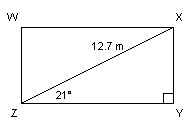 a. | 54.0 m2 | b. | 420.2 m2 | c. | 98.1 m2 | d. | 61.9
m2 |
|
|
|
19.
|
Two trees are 55 yd. apart. From a point halfway between the trees, the angles
of elevation of the tops of the trees are measured. What is the height of each tree to the nearest
yard? 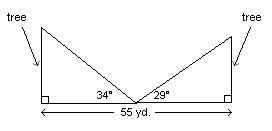 a. | 33 yd.; 31 yd. | c. | 41 yd.; 50 yd. | b. | 19 yd.; 15 yd. | d. | 40 yd.; 49 yd. |
|
|
|
20.
|
From the top of an 80-ft. building, the angle of elevation of the top of a
taller building is 49 ° and the angle of depression of the base of
this building is 62 °. Determine the height of the taller building to
the nearest foot. 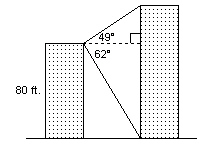 a. | 211 ft. | b. | 112 ft. | c. | 129 ft. | d. | 276
ft. |
|
Short Answer
|
|
|
21.
|
A road increases 8 m in altitude for every 100 m of horizontal distance.
Calculate the angle of inclination of the road, to the nearest tenth of a degree.
|
|
|
22.
|
a) For ÐM in the triangle below, label the
hypotenuse and the opposite and adjacent sides. b) Determine tan M to the nearest
hundredth. 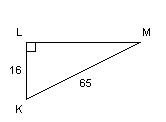
|
|
|
23.
|
A communications tower is 300 m high. Rebecca is driving toward the tower. The
angle between the ground and Rebecca’s line of sight to the top of the tower is 5°. About
how far is Rebecca from a point on the ground vertically below the top of the tower, to the nearest
hundred metres?
|
|
|
24.
|
A flagpole is 14.0 m high. At a certain point, the angle between the ground and
Jon’s line of sight to the top of the flagpole is 63°. About how far is Jon from the
flagpole, to the nearest tenth of a metre?
|
|
|
25.
|
A ladder is 7 m long. It leans against a house. The base of the ladder is 2 m
from the house. What is the angle of inclination of the ladder to the nearest tenth of a
degree?
|
Problem
|
|
|
26.
|
Determine the measures of  and  to the nearest tenth of a
degree. 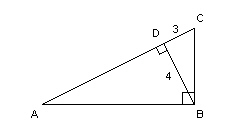
|
|
|
27.
|
Guy wires are attached to buildings as shown. A student says the angles of
inclination of the wires are the same. Is the student correct? Justify your answer. 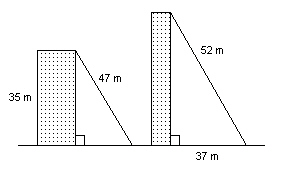
|
|
|
28.
|
Determine the area of this right triangle to the nearest square metre. 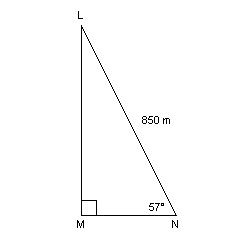
|
|
|
29.
|
Determine the perimeter of this triangle to the nearest tenth of a
centimetre. 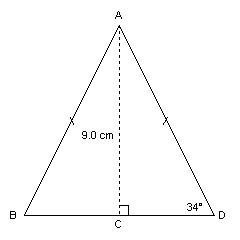
|
|
|
30.
|
Determine the length of the diagonals in this kite to the nearest tenth of a
centimetre. 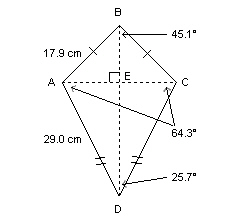
|